From 1986 through the early 90s Turner Scott Van Blarcum was easily the most recognizable, outspoken, memorable, and talked about local singer and figure of that that era. During those years Sedition became one of DFW’s earliest underground-breaking Metal bands as they helped this area’s Metal scene reach an all-time peak. I sat down with Turner one afternoon in March at the Bar Of Soap and we reminisced about those good ole band days he experienced with Talon, Sedition and Pump’n Ethyl. We even rapped about his enormous bone collection that would lead to him designing stage sets for the bands Ministry and Cypress Hill. He also talked in depth about that infamous night back in 1991 when he had an unforgettable confrontation with Nirvana’s Kurt Cobain (RIP) at Trees in Deep Ellum.
When did you first get into metal? What were some of the early bands that were an influence on you?
I was listening to Black Sabbath and Kiss and this and that. But, fucking… I gotta give props to Casey Orr man. Rigor Mortis dude… Haha! He turned me on and fuckin’ got me going… opened my mind up. That’s when we all started fuckin’ getting harder and faster.

Right, I agree… I mean I was always into the older stuff, too, until I started hanging around with those guys.
Yeah man, he turned me on to Motorhead, Riot, and Destruction and a lotta bands. Hey, Rigor Mortis is my influence.
So I know you were a drummer there for a while. Were you ever actually in any bands?
Oh yeah man, I played in bands. I played with my brother’s country bands. Me and Mike Scaccia did this uh… I think it was… I can’t think of the guy’s name. But anyway, we played with this Elvis impersonator cat. It never got off the ground… but that was about it.
Ok, so I remember it was probably around 1984 when you moved over there off of Hard Rock Road in Irving. You formed a new band with brothers Pete (guitar) and Phil (drums) Lee. Hard Rock Road became the temporary name for the band. That was when you first decided to become a singer. Do you remember what made you just say, “Man, it’s my turn to get up there and I wanna become a front man.”?
Well, I think I came to the rationalization that I was a shitty drummer… and I wasn’t getting any pussy… Hahaha! I figured I might get laid if I started singing…. Hahaha!
Y’all started out playing mainly covers in that band right? Like Alice Cooper, Steppenwolf and Black Sabbath right?
Yeah and Dio, Iron Maiden, and then we started doing Metallica right when Metallica started fucking poppin’.
Do you remember when y’all decided to change the name of the band from Hard Rock Road to Talon and started working on original songs?
Yeah, that was the high point. That was probably one of the best gigs we did, man. We opened up for you guys at New Year’s Evil … with Gammacide, Morbid Scream… I got the flier still on the wall. Anyway, we changed the name to Talon in 86/87. We were still doing covers but fuckin’ uh… ya know we started writing original music. But by the time Sedition rolled around it was all originals.
I know you started with Pete Lee (guitar) and Phil Lee (drums) and then you added Eddy Carter (bass), right?
Yeah, Eddie Carter was the original bass player. Then we got some kid… red-haired kid from Waco named Scott something… that was near the end of it. And Mike Dunn on drums, I forgot Mike Dunn joined up after Phil left… ya know everybody fell apart.
When you guys decided to change the name to Talon and go heavier, that was around the same time period after Slayer’s “Reign In Blood” came out and the underground thrash scene was starting to kick in. So do you think you guys were at the right age and right there at the right time to go along with that movement? Would you agree with that?
Oh fuck yeah… we fell right on in man. Also, Punk Rock started crossing over into metal… D.R.I. and all of that.
You released a demo under the name of Talon. What were some of the songs, lyrics and subjects on that demo?
I wrote one about Charles Manson. “Summer Of Hate” was the name it. There’s lines like uh… I actually took it from the actual words of Charles Manson right… that book about him talking about himself. {Doing an impression of Manson with his voice… Turner then begins to give me some lines from the song} “At the age of thirteen I raped the Preacher’s daughter and choked her little brother for snitching on me.” … Hahaha and that kind of shit. One song Pete Lee did called “Pestilence” was bad ass… he sang on that one. We were fuckin’ writing about all kinds of crazy shit. We didn’t start getting political until Sedition hit. That’s when we started seeing everything.
I am sure you remember the Deep Ellum scene back around that time. It was a lot different than it is today. There was a big Punk scene going on in some areas. There were also the more trendy types of bands like Edie Brickel and The New Bohemians in other parts of Deep Ellum. But there was no metal scene at all at the time. What are some of your memories back then as metal first started making its way into Deep Ellum?
Shit man, I will never forget the first time I saw Rigor Mortis play at the Circle A Ranch, man. That was before you joined the band and it was still a three-piece band. Man, that night was just intense, ya know? I had never seen all of that shit before. It blew my mind. I knew I was at home. That was when me and Mark Oberlander (RIP) started doing a sound company and running sound down there. But the most intense show that I saw was Rigor Mortis and Samhain. When Rigor Mortis played the cops showed up. The cops were outside busting everybody. Then when Samhain came on and they had two songs left, the cops came in fully armed, riot gear, Batman shields, all that shit and they stopped the show. But I have to say the best one we ever did was with you guys at the Arcadia Theater man… New Year’s Evil. That was the bomb! Do you remember that guy Gonzo? That was his nickname… we can say this because that was his nickname. He came up to me that night and said, “Man, I sold over 350 hits of acid tonight. We’re gonna have one hell of a party… I made a lot of money!” I was like, “Right on, now I can fuck with these motherfuckers.” It was fun man… that was the bomb back then. That was a great gig too, man. That night… fuckin’ Mike and Casey came up and played and Phil Lee sang a GG Allin song… “Now We’re All Gonna Die”.
Do you remember when and why you decided to change the name from Talon to Sedition?
Yeah, because when we released the Talon cassette there was a band in Europe called Talon. That’s when me and Pete Lee got our publishing company set up and we were trying to get the name copyrighted. Then we found out somebody else had already released a record under the name… some Glam band from Germany or something. So we had to change the name and the name Sedition just fit, because during this time period, ya know, Ronald Reagan was fucking things up and it was just a mess. It was time to secede. I used to say, “Man, if Texas would secede from the Union, I would fight every day and wouldn’t take a lunch break… Hahaha!”
After the band changed the name, you recorded two demos as Sedition, right?
Yeah, that was in ’87 and we recorded it out in our driveway in a mobile studio. To me the first Sedition tape… we call it “Sedition White”… because it was white and just said “Sedition”. That had only like 4 or 5 songs on it… that tape was the bomb to me. It had “Road Kill” on it, “Sedition”, “Product of Your Faith” and uh… I can’t remember the rest of ’em. Anyway, that was the shit! The second demo we did at Crystal Clear Studio with Keith Rust. I think that was also in ’87 around the same time period. We didn’t last very long, ya know? It sure seemed like a long time though.
When did Mike Dunn come into the band and replace Phil Lee on the drums?
That was in 87′ after Phil left. Mike Dunn did all of the Sedition stuff. Eddie Carter (Bass) was on the Talon and both Sedition demos. Then he quit ’cause him and Pete were fightin’ man, ya know? That was the whole deal. That is why Phil quit too… his brother… Hahaha! And that’s why I quit too! You can print that. I don’t give a fuck.
People fear death even more than pain. It’s strange that they fear death. Life hurts a lot more than death. At the point of death, the pain is over.
– Jim Morrison (The Doors)
How would you describe yourself back then as a singer and your stage persona?
Pissed off… Hahahaha! Pissed off, man… but having fun, though… fuck we had a blast back then. I don’t know man… it’s kind of hard to say. I know that at that time period, man, music was changing… there was change in the air. Punk Rock was crossing over into Speed Metal… Speed Metal was crossing over into Punk Rock. Yeah, I’d say I was pretty pissed off. I didn’t like what was going on with the government and to this day I don’t. I definitely had an attitude back then… Hahaha!
You used to take knives or swords or both on stage back then and cut your arms during the show. Was that something you thought about doing or did it just come out one night on stage?
No, actually, man, where I got that from is fuckin’ I remembered when Mike Scaccia and Rigor played at the Circle A Ranch, Mike carved an A on his arm. No, I’m sorry, somebody else did it to him. I thought… “Man… Fucking A!” Then, ya know, we all carved A’s on our arms. Then we started playing Tick Tack Toe… me and Big Jim Dolan, we were always playing with knives, man, ya know? Back then… do you remember that shit, man? … if it was your birthday everybody got beat to ever how old you were. Dog piled… taking a beatin’… playing Tick Tack Toe with knives…that’s where it all started. But carving an anarchy symbol on my arm, that’s where my mind was, ya know? Anarchy… and it’s still there too. It’s just the difference is… I’ve mellowed out a lot. Hey, you gotta pass the guns down and let somebody else do it. Let some young bucks come up and kick some ass!
What are some of your best memories of that time-period back then and some of your favorite places you played at?
Man, I thought the Tombstone Factory… regardless of what everyone wants to say about Jerry Warden… that was the shit! That was about as close as fuckin’ gettin’ to Hardcore… Punk Rock… Metal as you can get, man… and I fuckin’ dug it. It was alive… it was fun, and man… fucking hot chicks… it was all good… Hahaha!
It seemed like there was always some crazy shit happening at shows back then. Is there any wild shit that happened at any of y’alls shows that really stands out in your mind?
Well, not that much with Sedition, but with everybody else…Hahaha! What I would say sticks out in my mind is when that motherfucker stabbed you in the back at fuckin’ Goddamn Joe’s Garage. That was pretty much the highlight and the peak of stupidity.
Yeah, it was… and Harden getting stabbed that night too and also Dave Spivey. Y’all beat the shit out of that dude that did it and Shane ran over him in his truck… remember? Hahaha… That was some crazy shit…
Hahah… That was it… that was the highlight.
{After pondering for a second to realize how funny it is that my highlight in life was almost getting murdered… I continue with the interview} Soooo… when and why did Sedition come to an end?
I had had enough… I couldn’t fuckin’ take it no more. We couldn’t replace Eddy Carter. The truth of the matter was, when Eddy Carter and Phil Lee quit the band, that was it. That was the band. And everybody had problems with Pete Lee because of his attitude and this and that. There was no replacing Eddy Carter and the reason why he quit was that Pete was all about money. And what money? What money did we make? It was all about writing the music and whose name was gonna be on what. Ya know, when ya cut it down like that… I mean… it was just stupid… so Eddy quit. After Eddy, there was no replacing the guy… same way with Phil. Well, Mike Dunn filled Phil Lee’s shoes… big time! ‘Cause we were going in the direction of getting faster. But after Eddy quit, it just got stupid and I had enough of it, so I quit. That was in ’89 when everything busted up. The last gig that we did was with Agony Column and Dead Horse at Trees. Remember the big fight broke out? Out front with all the skinheads and all that shit and I was up there on stage getting a blowjob from a titty dancer. Please print that… thank you very much… Hahaha!
Did you ever get any label interest before the band broke up?
Oh, yeah. Oh, hell yeah, man. Metal Blade… man we were big overseas… we sold more tapes overseas, ya know… underground shit. And Hell…fuckin’ over here ya didn’t have enough to get a Popcorn fart, ya know?
Speaking of Dead Horse… what are some of the other bands that you guys did shows with back then?
Oh man, we had a blast. We had a blast playing with you guys. As far as local guys, we played with Gammacide, Rigor Mortis, Arcane, Utopia, Bliss, Shitface. Like as far as opening for major bands… Flotsam and Jetsam, Suicidal Tendencies, Circle Jerks and D.R.I. Yeah, it was a blast… you should have been there, kiddies!
After a few years away from being in bands you started singing for a Punk band called Pump’n Ethyl in the 90s. How did that band come together?
Well, man, I got sobered up, I quit drinking. I’d went out on the road with Ministry in ’91 and ’92 during the Lollapalooza and Psalm 69 tours and I about drank myself to death. I mean I had the time of my life… no regrets… it was a blast, man. Fuckin’ money was rollin’, hot chicks, the whole Rock N Roll package. But when I got off the road and got sobered up, I was itchin’ to play. Pete Lee and Casey Orr were playing with GWAR by then and they played at Dallas City Limits. It was after Pete Lee got shot and they did a benefit for him. Some crackhead shot him in a car or something. Anyway, I got up on stage and sang with The V Suckers… with Hank Tolliver… the future guitar player of Pump’n Ethyl. I got up there and sang a song with them and we did “I Wanna Be Your Dog” and “Cherry Bomb”. And man, it just felt so fucking cool just to be able to play again, because I hadn’t played in so long. I had got burned-out on it and I went out and did other things, ya know? So we started doing Punk Rock. Ya know, I just caught the tail end of Punk Rock… I got the see the Circle Jerks, Dead Kennedys, Exploited and this and that. But I wasn’t a Punk Rocker back then, man… I was a Metalhead and still am. But fuckin’ we started doing this Punk Rock stuff, and man, I just dug it. It was a total different thing. Instead of being agro or fighting, man, we were up there partying and throwing beer on everybody. And man, fuckin’ I got more pussy in that band than I did in Sedition…Hahaha!
I remember the band was originally called Ethyl Merman. How did you come up with that name and what year was the band actually formed?
Ethyl Merman started up in ’94 and that was a blast. We couldn’t come up with a fuckin’ name. We had beaten ourselves up for a name. And I had been working out, I’d gone sober and quit drinking. As you can see, under this party ball there is a 6 pack, but I was working out and wasn’t drinking then because my liver had gotten fucked up. But I am alright now… knock on wood. Anyway, we was watching “It’s A Mad Mad Mad World”… Jonathan Winters. We thought about calling the band Jonathon Winters. But we were making a joke about Ethel Merman. Ethel Merman was starring in the movie too, and I was singing like Ethel Merman, ya know… I can sing that song “I Don’t Wanna Go To The Betty Ford Clinic” like Ethel Merman… Hahaha! So we decided to go with that name, and we never thought in a million years that anybody would give a shit. We never thought in a million years that anybody would ever give a shit… PERIOD… about this band… and then we get signed… ya know? With Sedition, we fuckin’ya know, Goddamn did everything we could do to get signed. Then we form a band and nobody gives a fuck, it’s all a joke, then we get signed…Haha! And we got fucked on that deal too!
When the band got signed y’all had to change the name from Ethyl Merman to Pump’n Ethyl, right?
Yeah, we had to change the name because the estate of Ethel Merman was gonna sue the record label… or whatever the hell David Dennard was lying about.
What was the name of the label you signed with?
It was Dragon Street Records. It should be called Draggin’ Feet, is actually what it should be called. When we put our second record out he [David] goes, “Man, this is punkier than the first.” I was like, “Punkier? Like Punky Brewster? What do you mean ‘punkier’, man?” It was heavier, it was harder, and it was faster, ya know? It was more metal, ya know. So come out and say it. But he didn’t. And that album was called “Lone Star Police State”. And there are only a few of those still floating around. In which, eventually I’ll have a web site going and I’m gonna release all the Sedition, Talon and everything we’ve done… get it out.
You had 2 releases under Pump’n Ethyl and when were those released?
Actually three… The Ethyl Merman demo in ’94, Pump’n Ethyl’s “Thank God I’m Living In The U.S.A” in ’95 and “Lone Star Police State” in 97. To me, that was the fuckin’ shit! Hank Tolliver, Mark Schafer and Phil Lee… I mean it was like playing with MC5 or something. It was a lot of fun, man.
What are some of the cooler bands that Pump’n Ethyl did gigs with and did the band ever tour?
The best one we did was with Fear. We played with Fear, Rich Kids On LSD, Suicidal Tendencies and Chaos UK. We did a southern tour but we never got it off the ground. It was like a Bat bouncing its butt trying to get off the ground ya know? Bad luck was hittin’ every angle on that aspect. But you can still get Pump’n Ethyl’s “Thank God I’m Living In The U.S.A” off the internet on the Dragon Street web site. But, like I said though… we’ll be releasing our own shit soon enough.
Why did Pump’n Ethyl come to end?
Oh man, it was a fuckin’ freight train of doom… Hahaha! Everybody was all fucked up on drugs and alcohol except for me and Hank… we were sober. And the other two were all a mess and it just fell apart, ya know? Nobody gave a shit. Actually it came to an end in ’99 when me and my bro Larry Rosales were working WWF and got blown up by a concussion bomb explosion, so I had to step down. I got tinnitus in the ears from it, so I can’t do live music anymore. I can do voiceovers and I can do stuff in the studio, but you know that doesn’t come very often with Hardcore music. Because nobody has the money for that kind of shit, unless you’re fortunate enough to have friends in a rock band that’s making money. So I quit because my ears were racked and hopefully we’ll go to court and settle up. And start a management company, is what I’d like to do.
But currently, you are working on doing some vocals for a Blues project, right?
Yeah I’m doing some vocals for a guy named Jack Morgan. His project is called Whip N Shack and Hank Tolliver is playing in it. I’m sorry I don’t remember everybody’s names that are involved in this, but there are some heavy hitters from the 80s and 70s… guys that fell through the cracks. What this guy is doing is he is giving everybody a CD of his music to different musicians of different genres. I was honored, ya know. I couldn’t believe that he handed me one because I don’t have the blues. But this sounds like The Doors meets ZZ Top. Ya know, it’s faster. It’s not really Blues… it’s heavy Rock N Roll, rhythm Rock ‘N Roll, I guess. But it’s kind of hard to describe… it’s different and it’s good… I’ll tell ya that. But uh… he handed it out to different musicians and everybody is gonna do their mix on it and apparently he liked what I had the chance to do, ya know. I wrote three songs for him… one is about gambling, one is about a whiskey drinking woman and the other one is about about stepping up to bat… ya know?
So what are you doing for a living these days?
Man, I am doing the same thing I’ve been doing since you met me, man… doing stage work. But I finally joined the union back in ’87… a union stagehand. I’ve got a union card and I’ve worked with all kinds of bands. Nearly every band that’s came through Texas I’ve worked for.
How did you get started collecting bones and did that lead to you designing sets for Ministry and Cypress Hill?
That all started as a kid… I found a Beaver skull in Colorado. But in Talon and Sedition we were doing a song called Road Kill and I’d take actual road kill and throw it on the crowd. Ya know, I had bones and I would tie it on everything. And then when Mike… when Rigor Mortis disbanded… Mike hooked up with Ministry, they were saying, “Man, this crazy fuck has got all of these bones”, and this and that. So I did their set for Lollapalooza. Then that took off and I did a set for Cypress Hill. I did their set and I did their video set for the “Insane In The Membrane” video. Then I did the Psalm 69 tour with Ministry, and now I’m doing their new tour. I don’t know the name of the record, but ya know we’ve been listening to the new music today… and it’s off the hook!! Oh man, the new Ministry is off the fucking hook! They got John Monte from Mindfunk, the bass player… this guy is incredible. They might have Scott Ian from Anthrax, I am not sure if that’s the lineup or not. But [Dallas native] Mike Scaccia is on guitar, Al Jourgensen is on guitar and vocals, Mark Baker is on drums and Kol Marshall is on keyboards. I am gonna make this set so fucking creepy, ya know, you guys gotta come see it. I don’t wanna describe it… just come out and see it. And you definitely gotta buy the new Ministry record, man. I mean it’s the dawning of a new era in Punk Rock/Metal. It’s like MC5 meets Iggy Pop meets Rigor Mortis… BAM!! I mean right in your face when you hear it. Anybody that’s into Metal and into Speed Metal that knows about Rigor Mortis and knows about where Metal came from is gonna dig the shit out of this, man. It’s off the fucking hook!!
From what I have heard I agree. So do you know how many bones are in your collection, and what are some of the wilder bones that you have?
Oh man, I gotta shit-load of bones… never enough. On the way up to El Paso going to the Sonic Ranch where Ministry and Mike Scaccia from Rigor Mortis are recording their shit, I found a Bobcat, and the head on this Bobcat is the size of the head on my Pit Bull named “Pardner”… man, wait until you meet him.
Now I wanna hear your side of the story about the Kurt Cobain incident at Trees in 91.
Nooo problem! I was doubling and doing security for Trees, plus I was working for Creyton from Peak Audio. And he just got this brand new monitor board… paid 45 hundred bucks for it… state of the art shit and he was so proud of it… so happy with it, ya know? And then Nirvana shows up, and I remember I had worked one of their shows at Club Clearview. And I didn’t realize that they were that big. This was when they were just starting to take off. And I remember the record “Bleach” was bad ass, ya know? And believe it or not, I liked Nirvana. I liked their music. But the guy was a fuckin’ jack-off… but he was off, and he’s dead… God rest his soul. Ya know, I hate to talk shit about a dead man.
Yeah, I know. But of course you had no idea when this happened that he was gonna commit suicide later.
No, I had no idea what was gonna happen later. Anyway, that night he smashed the monitor board and he beat it with his guitar. He just smashed it and broke the guy’s hand… his own monitor man. First he was complaining that the kids were all over the stage. So they wanted me to double as security to help keep the kids off the stage. I made a lot of money that night… Haha! And then he got mad at his monitor man and smashed the monitor board, and then he jumped out into the crowd. Well, he had smashed the monitor board and I couldn’t believe he did it. So, ya know, I’m standing there and Creyton comes up to me… the owner… and he’s like, “Turner, what fuck!?” I was like, “Man, don’t worry about it… these guys aint getting out of here without paying for it. Ya know, even if I have to personally whoop all of them… because I am pretty sure I could take ’em all on… ya know?” But anyway the little bastard fuckin’ dove out into the crowd and was kicking his feet into the monitors. And I yanked him up by the hair of his head and tried to pick him up and throw him back on stage. And the kids were pulling his clothes off… they had a hold of his hair… everybody’s ripping on him. Right then the little fucker hit me on the head with a guitar. After he did that it knocked me out, so now I am going by the video footage. It knocked me out and I pulled back a handful of strings off his guitar. But he gets up and ya know, I see the blood on my head… so I fucking nailed his ass and kicked him. I think I kicked him in the head…to be honest I couldn’t tell if I had landed a good kick or not. But I waited in a parking lot afterwards for his ass when they were about to leave. Russell Turns is the monitor man down there… I think he’s the sound man now… I don’t know. He came up and said, “Turner, he’s going out back!” So I go running around the back and I hear… “Get in… get in cab… GET IN THE CAB!!” Ya know, they’re telling him to get in the cab and all these people just dog pile me man, and hold on to me. And I was watching the cab go and he was trying to get on Elm Street and I see the brake lights and the cab stop. So I go, “It’s cool… it’s cool, man…I’m alright… I’m alright… I’m dizzy.” Because I was bleeding profusely from the head. So uh… when they let go of me I went running across parked cars and I went over there and started kicking the cab and I kicked the taillights and headlight out of the cab. My plan… my objective… to take control of the situation… like our Nazi President George Bush does. And I was gonna kick the headlights out… and get the cab driver out… kick his ass… get the keys and then start workin’. Well, that didn’t work and I’m runnin’ around and there were a bunch of kids with us, too. I can’t remember this kid’s name, but he had real long hair… a Hispanic kid… a heavy metal kid… and he was right there, man. I wish I could remember his name. Man, I punched that cab’s window and it fell. I went right though it on top of them.
You smashed the cab’s windshield with your hand and what was Kurt Cobain doing?
Yeah, I went right through it… I mean I went in… all the way. He gave me a peace sign and that’s when I said… “Fuck it!” That mad me so fucking mad, I went through the window on him. I bit his nose, man… Haha…and I fuckin’ had his nose in my teeth and I’m telling him that I’m gonna walk through his dreams until he’s fucking dead… right. And everybody pulled me off of him and I got out of there unscathed. I thought I was gonna get sued by… I kept receiving letters from Geffen Records… this and that ya know and I’d throw them away. Then I talked to Jeff Liles… Jeff Liles, ya know the guy that worked with Rigor Mortis. He wrote this real sweet juicy letter to Geffen. And I kept thinking they were gonna sue me. Well, they sent me three grand to shut me up… and I wasn’t about suing this guy… I didn’t give a fuck… I wouldn’t piss on him if he was on fire.
Didn’t the video end up on one of those tabloid talk shows like Inside Edition or Hard Copy or something?
I have no idea… I know that asshole… well, the jerky that filmed it… I gave him a reenactment. I can’t remember his name… oh yeah… Brad Featherstone. I gave him a bitch-slap… fuckin’ when I saw him. He’d released it without telling me nothing … ya know? All I know is the next thing I know it’s being shown in Deep Ellum. It got released… all that kind of crap… because of that Brad Featherstone guy… I gave him a good slap. I wish I had some royalties off of it, I’ll tell ya that. I’d like to see… well somebody’s got footage of me pumping the window out… I’d like to see that… I don’t know who has it.
It looks like you landed a couple of good punches in the video… and he went down.
Yeah, I clocked him one good one…I didn’t throw it off the hip or off the shoulder…if you see it you can see… I was out…he knocked me out… I didn’t remember doing any of that. He clocked the shit out of me with that guitar, man. I had to go get staples in my head. I looked like Herman Munster with 13 staples in my head. It cut a vein on my forehead and it wouldn’t quit bleeding. So I remember when I came home and Biker Marc is like, “Man, did somebody shoot you?” I go, “No, man… some junkie Rock Star hit me on the head with a guitar.” So the next day they are waking me up going… “Dude, you’ve got to go to the hospital, man… you’re white…you look like you’re turning blue.” So they took me to look in the mirror and I had lost a lot of blood. So I go down there and Biker Marc is going, “Yeah, that’s right…it was Kurt Cobain from Nurvaana.” Hahahaha!
The TV business is uglier than most things. It is normally perceived as some kind of cruel and shallow money trench through the heart of the journalism industry, a long plastic hallway where thieves and pimps run free and good men die like dogs, for no good reason.
– Hunter S. Thompson, Generation of Swine: Tales of Shame and Degradation in the ’80s
Interview conducted by Bruce Corbitt
No Comments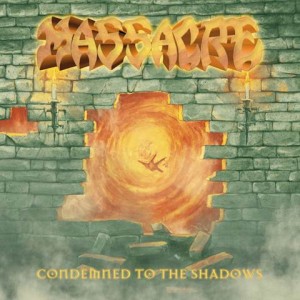 http://soundcloud.com/centurymediarecords/massacre-succumb-to-rapture
http://soundcloud.com/centurymediarecords/massacre-succumb-to-rapture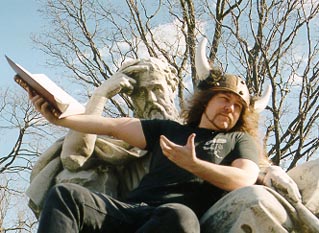

 How many copies of The Grimoire do you distribute each month?
How many copies of The Grimoire do you distribute each month?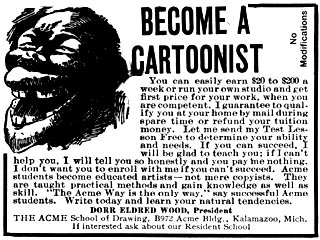 In this movie, do events move according to a script, or is it more of a cut-up format in the style of W.S. Burroughs’ Naked Lunch?
In this movie, do events move according to a script, or is it more of a cut-up format in the style of W.S. Burroughs’ Naked Lunch?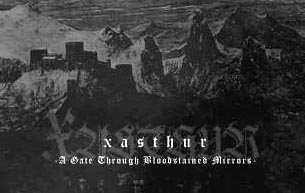
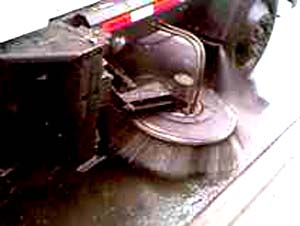



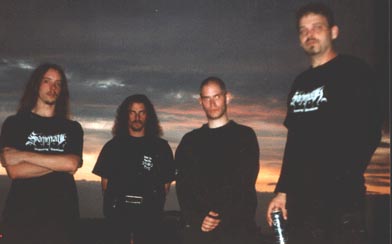
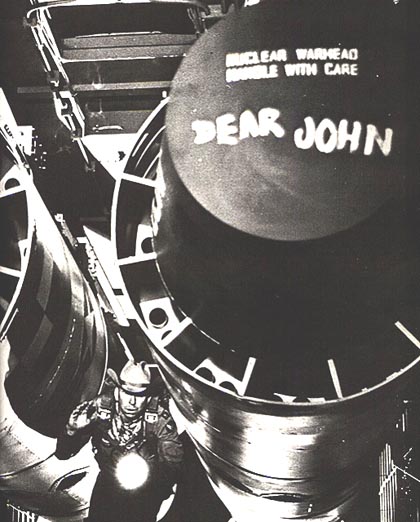
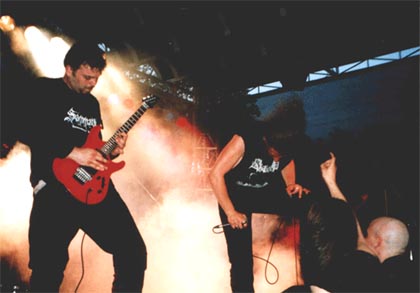 Do you think that popular music will ever turn toward being more like classical music?
Do you think that popular music will ever turn toward being more like classical music? It was fortunate to get in touch with this band as it gives a new perspective to the mix of interviews here: a black metal band from Israel who are pro-Israel and pro-Judaism/Jewish culture, from the sounds of what they say here. Because of linguistic confusion, it was hard to figure out exactly where they stand on many issues and Ze’ev declined to answer some of the “hot issue” questions, but what is remarkable revealed here is the attitudes toward black metal of people living in a place that to most of us, is inconceivably remote and linked to one of the great enemies of black metal, Jehovah. Many thanks to Ze’ev for taking a chance on us and giving a lengthy interview which was interrupted only when Palestinians in bulky overcoats began to arrive nearby…
It was fortunate to get in touch with this band as it gives a new perspective to the mix of interviews here: a black metal band from Israel who are pro-Israel and pro-Judaism/Jewish culture, from the sounds of what they say here. Because of linguistic confusion, it was hard to figure out exactly where they stand on many issues and Ze’ev declined to answer some of the “hot issue” questions, but what is remarkable revealed here is the attitudes toward black metal of people living in a place that to most of us, is inconceivably remote and linked to one of the great enemies of black metal, Jehovah. Many thanks to Ze’ev for taking a chance on us and giving a lengthy interview which was interrupted only when Palestinians in bulky overcoats began to arrive nearby…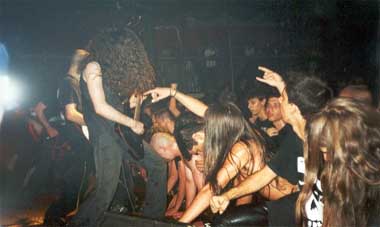
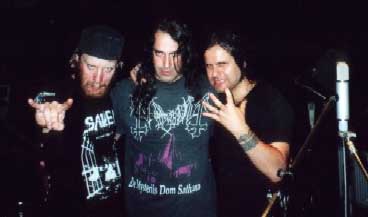
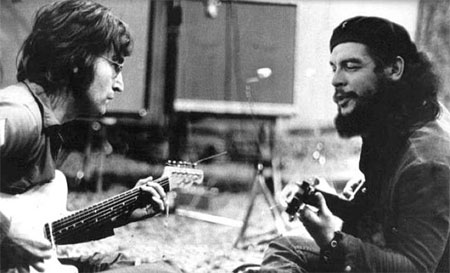
 People love to talk about music. A story about Ken Caillat’s new book covering the inside story behind the Fleetwood Mac album, “Rumours,” had several readers gushing about their own favorite albums. Seems there are all kinds of “perfect albums” for all kinds of tastes.
People love to talk about music. A story about Ken Caillat’s new book covering the inside story behind the Fleetwood Mac album, “Rumours,” had several readers gushing about their own favorite albums. Seems there are all kinds of “perfect albums” for all kinds of tastes.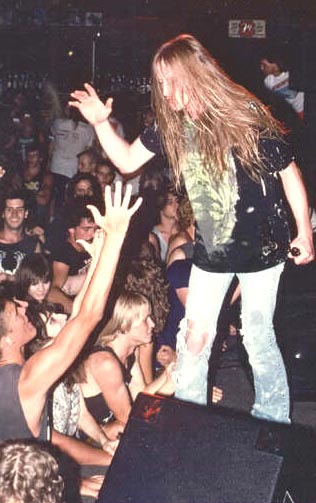 You are writing a book on your experiences, including rigor mortis. How does writing compare to music writing?
You are writing a book on your experiences, including rigor mortis. How does writing compare to music writing?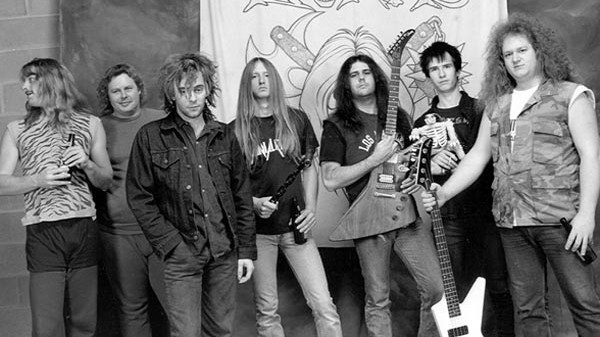
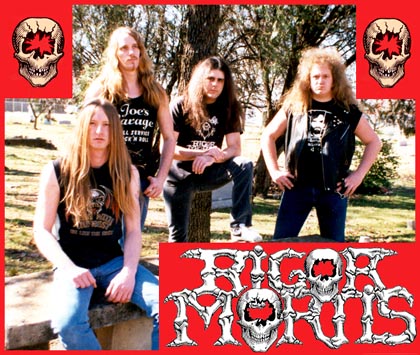 If you did form a metal band again, what kind of music would you make?
If you did form a metal band again, what kind of music would you make?
